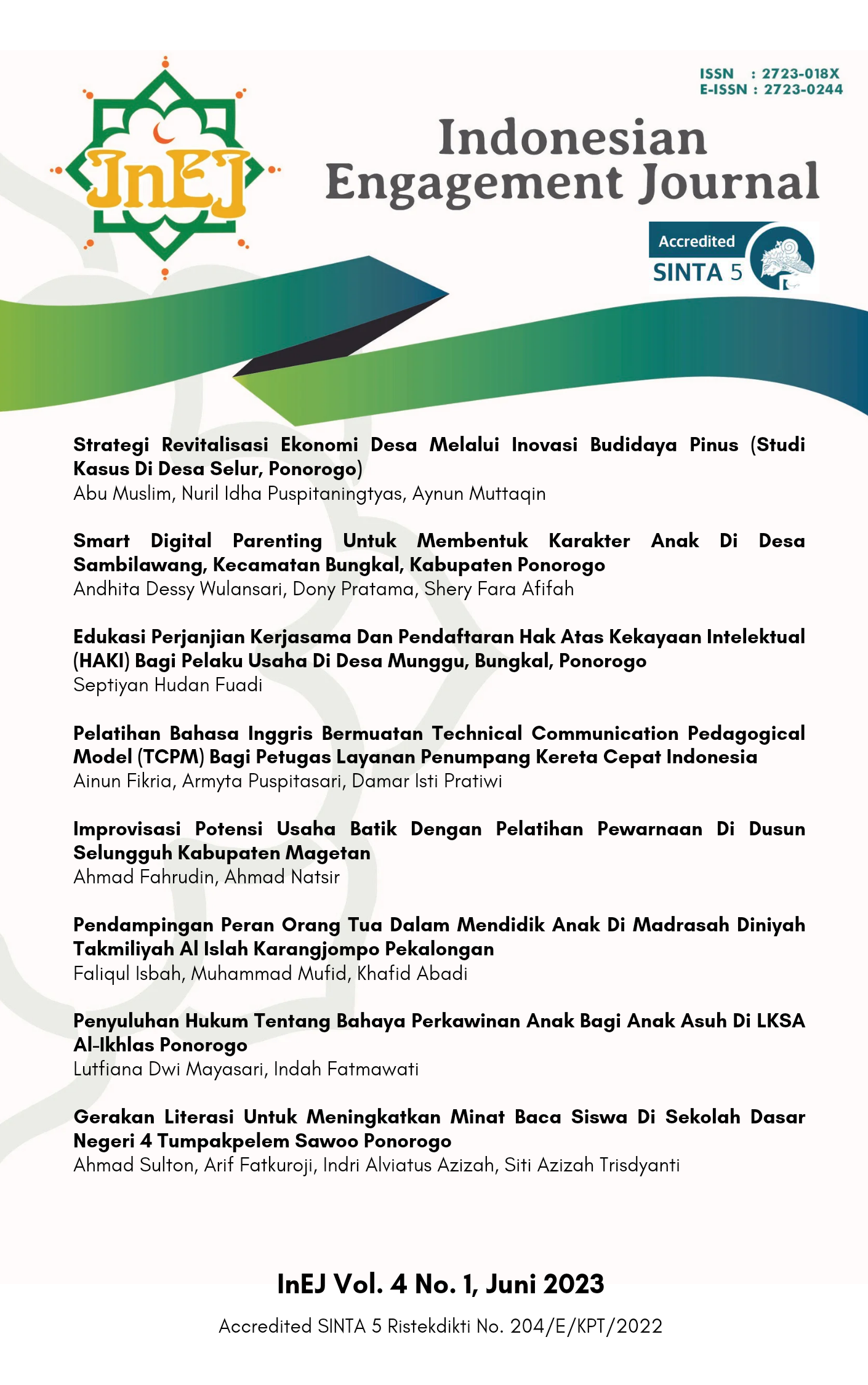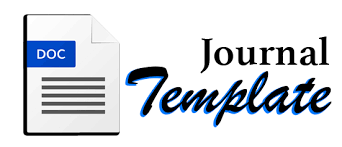PELATIHAN MANAJEMEN MADRASAH RISET MENUJU MADRASAH UNGGULAN DI MTSN 1 NGANJUK
DOI:
https://doi.org/10.21154/inej.v4i1.7253Keywords:
Service, Research Madrasah, Education QualityAbstract
Rendahnya kualitas penelitian baik yang dilakukan oleh siswa ataupun guru menjadikan program madrasah riset sebagai upaya untuk mengembangkan kemampuan berpikir ilmiah, setidaknya madrasah memiliki suatu pemicu semangat dan memiliki suatu jalan/metode untuk berkembang lebih baik lagi tidak hanya dalam ranah nasional, namun juga internasional. Penelitian pengabdian ini dilakukan di MTsN 1 Nganjuk dengan menerapkan metode Asset Based Community Development (ABCD) melalui aspek-aspek Problem Based Approach, Need Based Approach, Right Based Approach, Asset Based Approach dalam menganalisis kebutuan program dan merumuskan tujuan pengabdian. Hasil pengabdian menunjukkan adanya peningkatan pemahaman dan kompetensi baik dari pendidik maupun peserta didik terhadap program madrasah riset serta desain impelementasinya yang dibuktikan dengan hasil penyusunan desain proposal penelitian dalam rangka menyusun karya tulis ilmiah berdampak pada meningkatnya kualitas manajemen madrasah khususnya dalam pengelolaan pengembangan program madrasah riset.References
Afrahamiryano, Afrahamiryano. et al. (2023). Pendampingan Penyusunan Proposal Penelitian Madrasah Young Researchers Supercamp Bagisiswa MAN 1 Sijunjung,” Communnity Development Journal, 4(1), 498-501. https://doi.org/10.31004/cdj.v4i1.12285.
Ali, Mohammad. Muhammad Asrori. (2014). Metodologi & Aplikasi Riset Pendidikan. Jakarta: PT. Bumi Aksara.
Aprilia, Puspa Wulan. Suryanti. Nadi Suprapt. (2021). Pembelajaran Inkuiri untuk Melatih Literasi Sains Siswa Pendidikan Dasar. Mudarrisuna: Media Kajian Pendidikan Agama Islam, 11(2), 250-268. http://dx.doi.org/10.22373/jm.v11i2.7256.
Arifin, Zainal. (2012). Penelitian Pendidikan: Metode dan Paradigma Guru. Bandung: PT. Remaja Rosdakarya.
Becker, E. (2001, August 27). Prairie farmers reap conservation's rewards. The New York Times. http://www.nytimes.com
Becker, L. J., & Seligman, C. (1981). Welcome to the energy crisis. Journal of Social Issues, 37(2), 1-7.
David, Miriam. et al. (2001) Children and School-based Research: ”˜informed consent’ or ”˜educated consent’.? Journal of British Educational Research, 27(3), 348-365. https://doi.org/10.1080/01411920120048340
Farih, Nailul. Umi Hanik. (2023, Sept 6). Outputs, Outcomes, dan Impact. Retrieved from https://image.monevstudio.org/outputs-outcomes-dan-impact.
Hershey Foods Corporation. (2001, March 15). 2001 Annual Report. Retrieved from http://www.hersheysannualreport.com/2000/index.htm
Hidayati, Kurnia. Kharisul Wathoni, Esti Yuli Widayanti, “Peningkatan Keterampilan Mengajar Materi IPA dan Matematika Berbasis Laboratorium bagi Guru Kelas Madrasah Ibtidaiyah di Kecamatan Mlarak Ponorogo,” Inej:Indonesian Engagement Journal 3, no. 2 (Desember 2022), 3.
Hidayati, Umul. (2019). Inovasi Madrasah melalui Penyelenggaraan Madrasah Riset. EDUKASI: Jurnal Penelitian Pendidikan Agama dan Keagamaan, 17(3), 238-255. https://doi.org/10.32729/edukasi.v17i3.636.
Kementerian Pendidikan dan Kebudayaan, Pedoman Kegiaatan OPSI (Olimpiade Penelitian Siswa Indonesia.
Khumaidah. Zainal Arifin. Zulkifli Syauqi Tantowi. (2022). Manajemen Program Riset Studi Kasus di MAN 2 Kudus Management of Research Program Case Study in the MAN 2 Kudus. EDUKASI: Jurnal Penelitian Pendidikan Agama dan Keagamaan, 20(1), 108-118.
Thoyib, Muhammad. (2021). Manajemen Madrasah Riset: Kajian Teoritis dan Implementatif menuju Madrasah Unggul dan Inovatif di Indonesia. Yogyakarta: CV Markumi.
Tim Humas. (2023, Sept 6). Riset dan Penerapannya dalam Kegiatan Belajar Mengajar. Retrieved from http://mtsnkotabatu.sch.id/berita/detail/riset-dan-penerapannya-dalam-kegiatan-belajar-mengajar.
Wayhie, Akhmad Hasbi. “Madrasah Berbasis Riset,” diakses pada 5 September 2023, https://kalsel.kemenag.go.id/opini/646/Madrasah-Berbasis-Riset.
Widjajanti, Kesi. (2011). Model Pemberdayaan Masyarakat. Jurnal Ekonomi Pembangunan, 12(1), 15-27.
Wijayanti, A. (2014). Pengembangan Autentic Assesment Berbasis Proyek dengan Pendekatan Saintifik untuk Meningkatkan Keterampilan Berpikir Ilmiah Mahasiswa. Jurnal Pendidikan IPA Indonesia, 3(2), 102-108. https://doi.org/10.15294/jpii.v3i2.3107.
Wulandari, Ria. (2017). Berpikir Ilmiah Siswa dalam Pembelajaran IPA untuk Meningkatkan Literasi Sains. Science Eduction Journal 1(1), 29-35. https://doi.org/10.21070/sej.v1i1.839.
Downloads
Published
Issue
Section
License
Please find the rights and licenses in InEJ. By submitting the article/manuscript of the article, the author(s) agree with this policy. No specific document sign-off is required.1. License
The non-commercial use of the article will be governed by the Creative Commons Attribution license as currently displayed on Creative Commons Attribution-NonCommercial-ShareAlike 4.0 International License.
2. Author(s)' Warranties
The author warrants that the article is original, written by stated author(s), has not been published before, contains no unlawful statements, does not infringe the rights of others, is subject to copyright that is vested exclusively in the author and free of any third party rights, and that any necessary written permissions to quote from other sources have been obtained by the author(s).
3. User/Public Rights
The spirit of InEJ is to disseminate articles published are as free as possible. Under the Creative Commons license, InEJ permits users to copy, distribute, display, and perform the work for non-commercial purposes only. Users will also need to attribute authors and InEJ on distributing works in the journal and other media of publications. Unless otherwise stated, the authors are public entities as soon as their articles got published.
4. Rights of Authors
Authors retain all their rights to the published works, such as (but not limited to) the following rights;
Copyright and other proprietary rights relating to the article, such as patent rights,
The right to use the substance of the article in own future works, including lectures and books,
The right to reproduce the article for own purposes,
The right to self-archive the article,
The right to enter into separate, additional contractual arrangements for the non-exclusive distribution of the article's published version (e.g., post it to an institutional repository or publish it in a book), with an acknowledgment of its initial publication in this journal (InEJ: Indonesian Engagement Journal).
5. Co-Authorship
If the article was jointly prepared by more than one author, any authors submitting the manuscript warrants that he/she has been authorized by all co-authors to be agreed on this copyright and license notice (agreement) on their behalf, and agrees to inform his/her co-authors of the terms of this policy. InEJ will not be held liable for anything that may arise due to the author(s) internal dispute. InEJ will only communicate with the corresponding author.
6. Royalties
Being an open accessed journal and disseminating articles for free under the Creative Commons license term mentioned, author(s) aware that InEJ entitles the author(s) to no royalties or other fees.
7. Miscellaneous
InEJ will publish the article (or have it published) in the journal if the article’s editorial process is successfully completed. The editors of Journal may modify the article to a style of punctuation, spelling, capitalization, referencing and usage that deems appropriate. The author acknowledges that the article may be published so that it will be publicly accessible and such access will be free of charge for the readers as mentioned in point 3.




